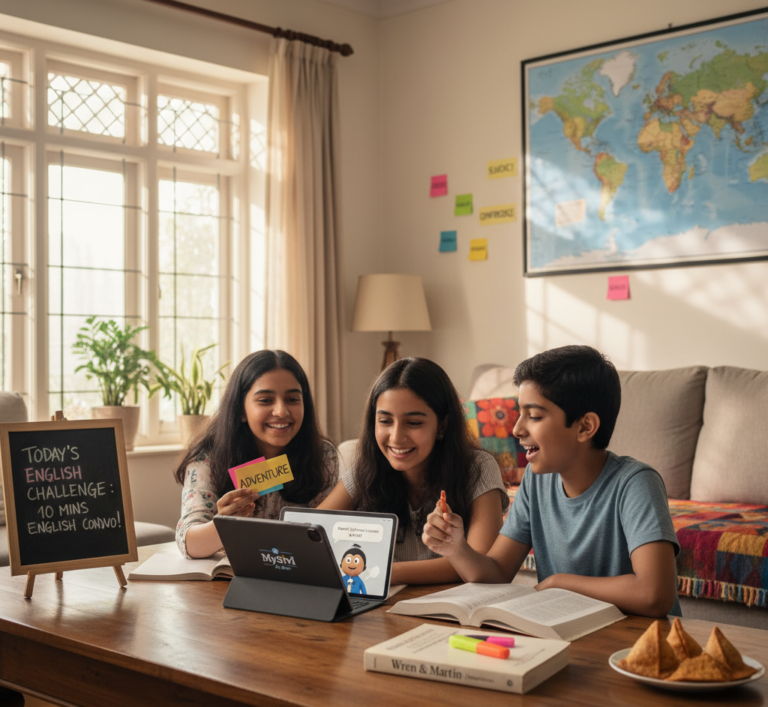
Boost your English skills at home in India. Discover fun apps, grammar books & daily tips for faster fluency, confidence and success in school and beyond.
Learning English has become one of the most valuable skills for teenagers in India today. Parents know that strong English communication opens doors to better education, careers, and global opportunities. But here’s the big question: how can teenagers learn English faster at home without making it boring or stressful?
Let’s explore practical, fun, and proven strategies that will help your child fall in love with learning English right from the comfort of home.
How to Start Learning English for Teenagers: The First Step Matters
Every journey begins with small steps. For teenagers, learning English doesn’t have to mean long lessons or strict rules. Start simple label household items in English, play “word of the day” games, or use English greetings during family conversations. These micro-moments create a natural environment where young learner of this age group start picking up words effortlessly.
Tip: Encourage them to speak even if they make mistakes. Confidence always comes before perfection.
How to Make Learning English Fun for Teens
If learning feels like homework, teens will resist it. But when learning is fun, it feels like playtime! Try storytelling sessions, role-playing games (like interviews, debates, or mock group discussions), or singing along to English songs and paying attention to the lyrics.
- Use colorful flashcards for quick memory boosts.
- Turn everyday activities (like cooking or playing) into English conversations.
- Reward creativity lets teenagers invent stories with their favorite cartoon characters.
- You can also turn hobbies into practice talk about cricket scores, K-pop, or gaming in English with friends.
Fun creates curiosity, and curiosity makes learning stick.
English Learning App: Bringing AI into the Living Room
Today’s teens love technology, and that’s where English learning apps come in. Apps make it easy for teens to practice English daily, with interactive lessons, quizzes, and rewards.
One standout is the MySivi AI App, a smart English tutor built not just for teenagers but for learners of all ages in India. Whether you’re a teenager starting out, a student looking to improve, or an adult eager to build fluency and communication skills, MySivi adapts to your journey. With MySivi, you can:
- Practice speaking with an AI that listens and corrects gently.
- Play interactive quizzes and games that improve vocabulary.
- Receive instant grammar feedback in a fun, non-judgmental way.
It’s like having a friendly English teacher at home—available 24/7.
Books to Improve English Speaking Skills for Teenagers
Technology is powerful, but books are timeless. Here are two classics every teen should explore:
- Wren & Martin (Senior Edition): A foundation book for grammar basics, explained in simple exercises teens can understand.
- English Grammar in Use by Raymond Murphy: Perfect for older teens, this book makes grammar less scary and more practical.
Pairing books with apps creates a balanced learning routine structured yet engaging.
How Rewards Motivate Teenagers Learning English Online
Teenagers love recognition. Whether it’s stars, stickers, or digital badges, rewards spark motivation. Apps like MySivi use gamification unlocking levels, collecting points, or earning certificates to keep teenagers excited about progress.
But remember: rewards don’t always have to be material. Even simple praise like, “I love how you said that sentence!” builds confidence and keeps the momentum going.

The Indian Home Advantage: Turning Daily Life into a Classroom
Living in India gives parents and teens unique chances to make English a natural part of daily life. Many schools in India already encourage or even enforce English conversations in classrooms. Sometimes, teens are given small penalties, like extra homework if they don’t use English in class or losing playtime, if they don’t speak in English. While this may seem strict, it shows how important English fluency is in today’s world.
But the real magic happens when learning continues at home. Here are some simple yet powerful ways Indian parents can support their teenagers:
- Start from the beginner level: Even if teenagers of this age group knows just a few words, encourage them to form small sentences like “I am eating rice” or “This is my toy.” Progress comes with practice, not perfection.
- Watch English shows with subtitles: Choose ones with clear speech sitcoms, documentaries, or even YouTube creators .
- Use bilingual storybooks: Books with both Hindi and English text allow teens to connect familiar ideas with new words. This makes learning English less intimidating.
- Practice with siblings and friends: Encourage short English conversations during playtime, like role-playing “shopkeeper and customer” or “teacher and student.” Teenagers learn best when it feels like a game.
- Daily family conversations: Dedicate at least 10 minutes where everyone at home speaks only in English, no matter how simple the sentences are. Parents practicing along even with broken English shows teens that mistakes are part of learning.
- Reward efforts, not just results: Instead of correcting every error, praise attempts. Saying “Good try! You almost got it right” motivates teenagers far more than constant corrections.
By blending school expectations with these home practices, teenagers in India get the best of both worlds: discipline and encouragement. Over time, English shifts from being a “subject” into being a living language they can confidently use anywhere.
The Hidden Demerits of Ignoring English at an Early Stage
In many Indian households, parents often think, “My child will pick up English later in school.” But the truth is, delaying English learning at home can create small but real struggles for both teens and parents.
For teens, the challenges show up quickly. A teen who avoids English in early years may feel shy or left out in class when teachers insist on English conversations. Sometimes, teenagers even face penalties like demerit points, extra homework, or gentle scolding for not speaking in English during school hours or during there college days. This can hurt their confidence, making them think English is something “too hard” for them.
Parents also feel the pinch. They might struggle to help with homework written in English or feel embarrassed during parent-teacher meetings when communication gaps appear. Over time, teens who don’t build a foundation early may hesitate to join competitions, group discussions, or debates opportunities that could boost their growth.
But here’s the hopeful part: these challenges are not permanent. With small efforts at home like reading simple English stories before bed, practicing five new words daily, or using apps like MySivi, teenagers can bridge the gap and rebuild their confidence. Early exposure makes English less of a “subject” and more of a comfortable habit, saving both teens and parents from unnecessary stress later.
Conclusion: Building a Lifelong Habit
Helping teens learn English faster at home in India is not about pressure, it’s about consistency, fun, and encouragement. With the right mix of daily practice, engaging apps like MySivi, classic grammar books, and reward systems, your child can not only learn English but also love it.
Remember, teens learn best when English feels like a friend, not a subject. Start small today, and watch their confidence grow tomorrow.